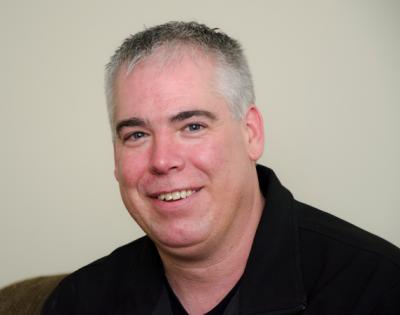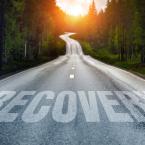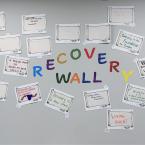
Scott struggled with PTSD, but didn't know what was wrong. He found help at The Village.
Scott Geiselhart should have died. The gun should have fired. Instead, when he aimed his revolver at himself and pulled the trigger, it just clicked. Nothing more. Scott slammed the gun on the desk at his mechanic shop in Frazee, MN. He was stunned and shaking.
A long, painful path led Scott to this moment. He had been a volunteer firefighter for 20 years. It was something he was proud of. He helped build the Frazee Fire Department’s extrication unit. “Got the truck together and all of a sudden, we got a bad run of some car accidents. Lot of fatalities,” he said. “Even without the extrication (vehicle), we ran across a lot of ice water rescue, lost a lot of people.”
Sometimes they were people he knew. He pushed the things he saw and heard to the back of his mind. But they weren’t gone. “You come home from a car accident where you pull a kid out of a car, you know, and he’s dead, and a half an hour later you’re supposed to be playing ball with your kid,” he said. “I couldn’t do it anymore.”
One accident was particularly hard to take. A young person had crashed into icy waters. They got him to Fargo, and things were looking good. It felt like a win for the good guys, but a few weeks after, he died. “And I started blaming myself for that,” Scott said. “And I started blaming myself for every other one before that.”
Scott had flashbacks and horrible nightmares. He’d dream that his children were on fire and falling into water or that they were being taken from his home while he watched, unable to help. He would go into fits of rage at home and at work. “Just uncontrollable,” Scott said. “Wasn’t really sure where it was coming from. Wasn’t really sure who it was. It was like Jekyll and Hyde.”
His emotions numbed. He developed a massive meth habit that grew to the point that he was doing “a line an hour, minimum,” he said. That kept him awake where the nightmares couldn’t plague him. “I know I didn’t sleep probably for about a year and a half, two years,” he said. “I mean, I’d lay down for a few hours every few days, but never really went to sleep.”
He knew he couldn’t go on like this forever. “For five years I figured my life was done,” he said. “I just kind of prepared myself for death. And I pulled away from everybody.” He didn’t understand what was going on inside him, and he was ashamed.
“I didn’t think there was any help,” he said. “I mean, I was embarrassed about it.”
One day, he decided he needed to get himself “out of the picture,” and quit hurting the people he loved. He pulled out a revolver he knew was reliable, “the one that I knew would do the job,” he said. “I mean, it was supposed to be fail-proof.”
But it did fail. “There’s only one reason that gun didn’t go off. It’s a perfect gun. It works fine. The only explanation is God,” Scott said. “There’s no other way that that gun did not go off.” After he dumped the shells out of the gun, he started searching the internet, and “PTSD lit the screen up.”
He ended up on the Mayo Clinic website learning about Post-Traumatic Stress Disorder. He couldn’t believe what he was seeing. “I mean, every single symptom down that list—it’s like every one of them was like looking in a mirror,” he said. He was surprised, but thrilled to finally begin understanding.
“I was so happy because I found out what was wrong with me and I wasn’t crazy,” he said. The National Volunteer Fire Council’s “Share the Load” program directed Scott to The Village Family Service Center in Fargo and the Eye Movement Desensitization and Reprocessing (EMDR) therapy available there. EMDR involves using stimulation (through vision, sound, or touch) to influence or interrupt how a client processes information. During this process they reflect on their trauma, allowing the individual to develop new thought patterns for dealing with painful memories.
“After I started counseling, the nightmares disappeared just almost immediately,” he said. He began to move from a world of dark shadows and despair to joy and color.
“It just felt like I could breathe again and see again,” he said. “I could see color.”
His attitude began turning positive, and the anger subsided. “I started talking to my pastor, and, wow, that was incredible too,” Scott said. “That was a huge part of it also – my faith.” He wasn’t afraid to sleep anymore. And, he says, with that inner turmoil calmed, with divine help, he was able to walk away from his meth habit. He threw away his stash of drugs and quit. It’s been over a year and a half since he did his last line, and he says he doesn’t even struggle with cravings.
The emotional numbness left, too. “I could love,” he said. “I could taste the air…I’d stand outside in the rain and just look up and – feel things.” He worried that it might all vanish. But it hasn’t. "That’s something that I just can’t get over – how every day is better than the last,” Scott said. “I think I could cure cancer with whatever this is, you know. It’s pretty awesome.”
Scott has a passion for helping others and has already begun speaking out publicly about his situation, in hopes of educating emergency workers and others about the dangers of PTSD and the hope for recovery. “I can’t shut up about it,” he said.
In short, Scott is loving life. “It’s awesome being alive. It’s the best drug I’ve ever had,” Scott said. “I feel sometimes as if I’m overdosing on life!”




